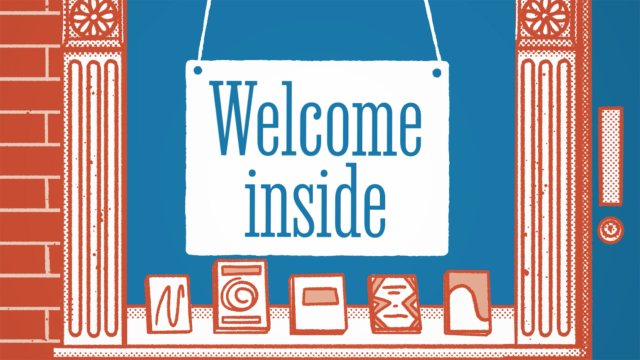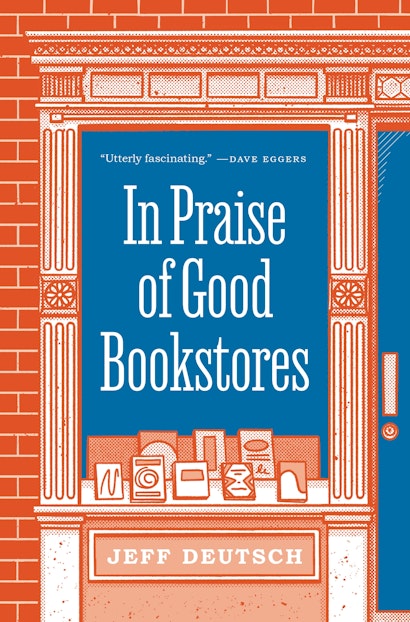Do we need bookstores in the twenty-first century? If so, what makes a good one? In this beautifully written book, Jeff Deutsch—the director of Chicago’s Seminary Co-op Bookstores, one of the finest bookstores in the world—pays loving tribute to one of our most important and endangered civic institutions. He considers how qualities like space, time, abundance, and community find expression in a good bookstore. In this conversation with Publisher Rob Tempio, Deutsch makes an eloquent case for the incalculable value of browsing.
Let’s begin with the seemingly mundane, but essential question, how did you come to be a bookseller?
JD: Like most career booksellers, I did not set out to become a bookseller. It was perhaps ten years after I started working in bookstores that I looked back and realized that I was, in fact, a career bookseller.
I had never given much thought to what I would do as a career. It was important to me to make a living so that I could focus on the things that mattered to me: reading, writing, and community. I was very lucky to have been a poor student and an underachiever. And I was very lucky to have my mother as a role model of how to ignore the approval of others and live for oneself. Had I not had her example, I would have likely sought a career that was more prestigious and better compensated.
One of my primary goals in establishing a not-for-profit bookstore is to build a model for future booksellers, that they might anticipate a respected (it needn’t be prestigious) and decently (it needn’t be well) compensated career.
What do you think are some of the key ingredients of a good bookstore?
JD: A good bookseller respects the idiosyncratic tendencies of readers, while also embracing the general interests of their community. It’s important to strike a balance between the predictable and the unpredictable; the comforting and the challenging; the reliable and the aspirational; the familiar and the surprising; and what children’s librarians call mirrors and windows. It should carry a mix of books that sell quickly and reliably, and books that sell a bit slower.
I recall a friend telling me once “bookstores relax me.” That resonated, but sometimes they also make me anxious with the sheer amount of books one has to choose from. In your book, you talk about the abundance of books readers are faced with? What role do bookstores play in helping them navigate that?
JD: Good bookstores have a sensibility. Perhaps they are something like the flavor enhancer, or sixth flavor, kokumi, which has been translated as “heartiness,” or “mouthfulness,” and speaks to a food’s “craveability.” It doesn’t have its own flavor necessarily, but it enhances the flavors with which it is combined. A good bookstore somehow enhances the books on its shelves.
Many readers understand intuitively that a book purchased online—even from a bookstore—has a different “flavor” than one discovered while browsing. A good bookstore creates a subtle and elegant craveability.
I was in new relatively small, but very well curated bookstore recently in Frenchtown, NJ and thought to myself, if it were up to me every town would have a bookstore like this. What role do bookstores play as cultural institutions?
JD: A well curated small bookstore—I’m thinking of Source Booksellers and 27th Letter Books in Detroit, Three Lives & Company in the West Village, or Point Reyes Books in Marin County, for example—can be as expansive a browsing experience as a “superstore.” And scarce are the communities that are better off without at least one good bookstore.
Books can and do provide great entertainment and escape, and booksellers respect and embrace readers seeking such pleasures. Books can also challenge and edify us. This too is important to our culture. While most readers are seeking a good read, at the risk of sounding precious, so many of us go into bookstores in search of ourselves. It is one of the few places where one can be in silent community with others, bound by a shared passion for a certain kind of inquiry, and a certain kind of lifestyle—one that privileges rumination and imagination.
You also say in your book “Good bookstores reflect their communities; exceptional bookstores both reflect and create their communities.” Can you talk some about bookstores as community centers, so to speak?
JD: The book is composed of five chapters: space, abundance, value, community, and time. I had a sixth chapter—on reverence—that I ended up folding into the rest. In the chapter on community, I cite Hanif Abdurraqib’s reflection on houses of worship: “the gospel is, in many ways, whatever gets people in the door to receive whatever blessings you have to offer.”
So many of the Seminary Co-op’s customers talk about the bookstore as a sacred or holy place. They say it with a slightly mischievous irony, but I can never tell if it’s because they are mostly serious or mostly kidding. In fact, even when I say it—which I do often—I’m not sure if I’m being playful or insistent.
And in thinking of what makes a space sacred—a house of worship—or what makes a community holy, it seems like it has to do with what draws people to a certain endeavor in a certain space. I have visited holy sites throughout the world, and, as a non-believer, I have felt what the hours and years and centuries of devotees, in reverence and repose, have sanctified. After six decades of operation, and hundreds of thousands of bookish pilgrims ruminating in the stacks, perhaps the Seminary Co-op too has become a house of worship.
Can you tell us some of your favorite bookstores, in no particular order or ranking of course?
JD: Don’t make me choose! But if I must here’s a partial list, at best, of some of my personal favorites…good bookstores all.
Solid State Books, Washington D.C., The Book Table, Oak Park, IL, City Lights Booksellers, San Francisco, CA, Moe’s Books, Berkeley, CA, Source Booksellers, Detroit, MI, McNally Jackson, New York, NY, Women and Children First, Chicago, IL, Boswell Book Company, Milwaukee, WI, Labyrinth Books, Princeton, NJ, Harvard Book Store, Cambridge, MA, Left Bank Books, St. Louis, MO, Moon Palace Books, Minneapolis, MN, and Wild Rumpus, Minneapolis, MN.
Jeff Deutsch is the director of Chicago’s Seminary Co-op Bookstores, which in 2019 he helped incorporate as the first not-for-profit bookstore whose mission is bookselling. He lives in Chicago.

